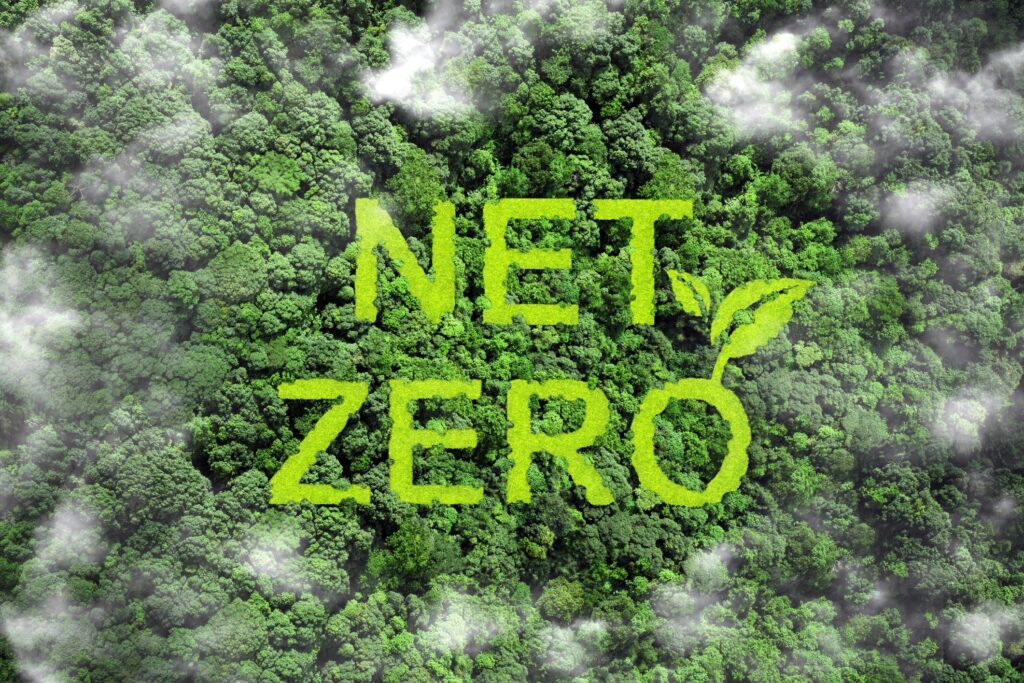The U.S. Environmental Protection Agency defines sustainability as “creating and maintaining conditions under which humans and nature can exist in productive harmony to support present and future generations.” The EPA says the concept “is based on a simple principle: Everything that we need for our survival and well-being depends, either directly or indirectly, on our natural environment.”
For businesses, sustainability can take many forms, but the end goal is the same regardless of the strategies pursued. That end goal is ensuring the health of the environment and protecting the Earth from the damaging effects of pollution and greenhouse gas emissions.
When considering transportation and logistics options, sustainability translates into developing initiatives that prioritize decarbonizing the supply chain. But to do that work effectively, companies need to realize that it’s best not to do it alone. Indeed, if the supply chain consists of individual links that source materials, manufacture goods, or ship goods from Point A to Point B, then the chain is stronger than the individual links.
At Greenabl, our job is to facilitate partnerships between companies so that businesses may see maximum benefit from collaborating with others to decarbonize the supply chain. As the popular saying goes, two is better than one, and there’s no better way to combat climate change than to fight together.
Supply Chain Decarbonization: An Industry Imperative in a Changing World
Decarbonization is a key strategy to combat climate change within the supply chain. Decarbonization is the act of reducing or eliminating GHG emissions. Within the context of the supply chain, decarbonization means pursuing a number of strategies, from using alternative fuels to determining the most efficient routes to eliminating idling, according to a May 2023 report from Science Based Targets.
In today’s age, companies should pursue decarbonization strategies as their contribution toward combating climate change. However, efforts to decarbonize the supply chain are not only a moral imperative but a regulatory one and a consumer one as well. Regulatory bodies worldwide, such as the European Union and the state of California, have implemented or are actively pursuing strategies to reduce GHG emissions along the supply chain or within the transportation sector. Companies must now keep track of their emissions and report them to regulatory agencies or else face penalties. Meanwhile, many smart consumers interested in preserving the environment for future generations are attracted and loyal to businesses that publicly commit to mitigating the impacts of climate change. To maintain consumer loyalty, businesses have to be one step ahead in the ways that they care for the environment.
With Expectations High, Shippers Struggle to Achieve Supply Chain Decarbonization Goals
While the pursuit of decarbonizing the supply chain is an admirable goal, getting there might seem daunting or intimidating at first. Not only are there numerous options or strategies to adopt, but there’s also a lot of ground to cover. A June 2024 study by the Boston Consulting Group points out that Scope 3 emissions—including emissions generated within the supply chain—tend to be overlooked by companies pursuing emissions reduction strategies.
But before we can overcome these challenges to supply chain decarbonization, we need to define what those challenges are. We’ll discuss three now: lack of data transparency and adequate measurements, fragmented supply chains consisting of multiple stakeholders, and investment and resource constraints.
Data Transparency and Measurement
Accurately measuring emissions across the entire supply chain can be complex due to the lack of standardized data and reporting practices. Many organizations also struggle to obtain reliable data from suppliers, which complicates efforts to assess carbon footprints and track progress toward decarbonization goals.
Efforts are growing to provide businesses with metrics that can measure and report emissions data. And from a practical standpoint, being able to communicate clearly and effectively with regulators over how much emissions reductions have occurred provides proof of regulatory compliance. However, there is still so much more work to be done with developing data standards and reporting practices that will not only address regulatory objectives but also enable companies to tell the stories they need to tell.
Fragmented Supply Chains
Supply chains often involve multiple stakeholders, including suppliers, manufacturers, and logistics providers, each with different sustainability practices and priorities. This fragmentation makes it challenging to implement coordinated decarbonization strategies, as aligning diverse interests and capabilities can be difficult.
Furthermore, some companies might fear that being more open about their operations and decarbonization strategies might make it easier somehow for competing companies to access sensitive data. This potential concern, whether grounded or not, highlights the need for companies to be open about their concerns over disclosure so that they can create a culture of trust, which is especially key when deciding to partner with others along the supply chain to pursue decarbonization opportunities.
Investment and Resource Constraints
Transitioning to more sustainable practices often requires significant investments in new technologies, processes, and training. Many companies may face budget constraints or lack the necessary resources to implement comprehensive decarbonization initiatives, hindering their ability to make meaningful progress.
Further complicating budget constraints is the perception that sustainability initiatives can be expensive. The financial return might not be felt immediately; some might argue that the financial return might not occur until years down the road.
Greenabl: Effective Decarbonization Begins with Collaboration
Despite these hurdles, plenty of good work can be accomplished and hurdles can be overcome when working together. Partnerships allow multiple parties to benefit from the experience of others. Here are some ways where collaboration results in shared results.
Facilitating Strategic Partnerships
Greenabl connects organizations with industry partners focused on sustainability, fostering collaborations between shippers, suppliers, and logistics providers. These strategic partnerships promote shared goals, enabling participants to pool resources, knowledge, and best practices to drive collective decarbonization efforts.
The benefits of partnerships are tenfold. Businesses that work with us are offered the opportunity to use standardized and vetted data calculation methodologies and access a cooperative procurement process.
We at Greenabl see the value so much in partnerships that we recently announced one ourselves. We’re working with Eco-Energy to offer Transport Emission Reduction Certificates (TERC), a voluntary carbon program for the transportation and logistics industry. TERC functions like a tradable digital certificate representing the full life-cycle GHG emissions of low-carbon fuels.
Providing Data-Driven Insights
Through advanced analytics and data solutions, Greenabl offers comprehensive visibility into supply chain emissions. This empowers organizations to identify key areas for improvement, track their carbon footprints, and collaborate on targeted strategies to reduce emissions, ensuring that all stakeholders are aligned in their sustainability objectives.
Our tools analyze data so that companies are able to identify opportunities to reduce emissions even further. By identifying emission hotspots, companies can craft strategies that support and enhance a company’s sustainability goals. As we’ve mentioned before, companies can use these data-driven insights to make informed decisions and push for greater outcomes from their suppliers throughout the value chain. Using insights gleaned from data analysis, users can compare carriers’ decarbonization performance and adjust their business relationships to align with companies that consistently deliver sustainable performance.
Supporting Joint Sustainability Initiatives
Greenabl facilitates joint initiatives that encourage collaboration among supply chain partners, such as coordinated logistics planning or shared transportation solutions. By supporting these initiatives, Greenabl helps organizations implement innovative practices that enhance operational efficiency while collectively reducing carbon emissions across the supply chain.
We help companies develop and maintain collaborations by serving as an experienced guide who has insights into streamlining processes in ways that benefit all parties. Our digital platform enables shippers to access real-time analytics that measure environmental impact and monitor decarbonization efforts over time. This collaborative approach toward sustainable supply chain management, provided in part through the digital platform, allows companies to see how individual contributions to reducing emissions might benefit the supply chain as a whole.
Come Partner With Us
In a rapidly changing world, sustainability is crucial for addressing environmental challenges, and partnerships play a vital role in achieving these goals. There is an urgent need for supply chain decarbonization amid increasing regulatory pressures and consumer expectations. However, many shippers face significant obstacles, including data transparency issues, fragmented supply chains, and resource constraints.
Greenabl offers solutions through collaboration by facilitating strategic partnerships, providing data-driven insights, and supporting joint sustainability initiatives. Together, these efforts empower organizations to overcome challenges and drive meaningful progress toward their decarbonization objectives.
Contact Greenabl today to learn how we can work together to reduce emissions and tackle climate change head-on.


